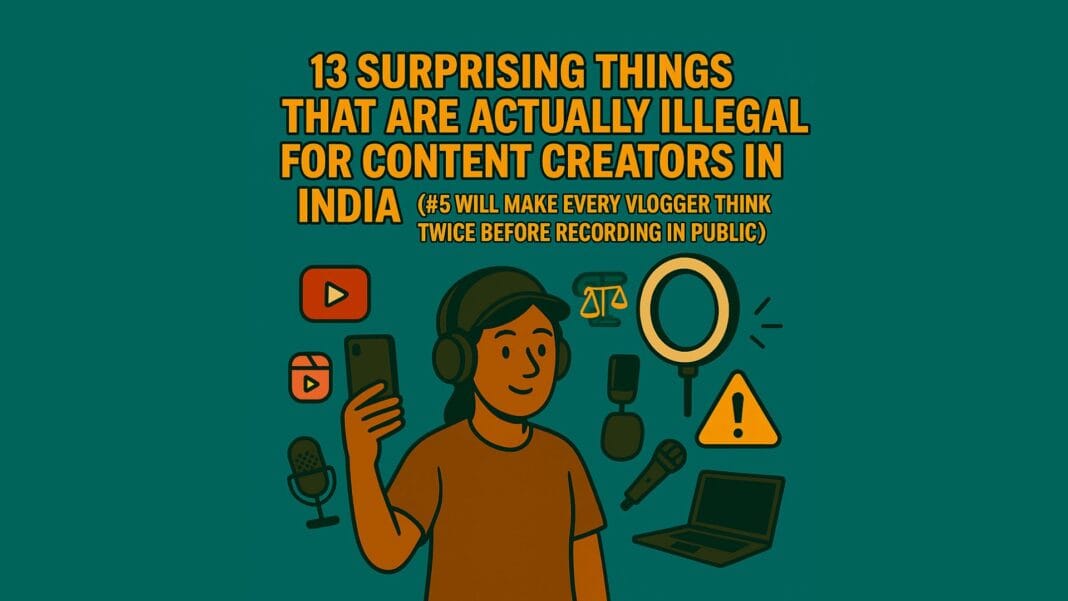From filming reels in cafés to using trending songs, Indian content creators live in a grey zone between creativity and compliance. But what if we told you some of your most viral ideas could also be technically illegal under Indian law?
Here are 13 surprisingly common actions that can get creators into legal hot water — and how to stay on the right side of the law.
Also Read: 10 Mind-Blowing Facts from the History of Law (Yes, It’s That Wild)
🚫 1. Using Bollywood Songs Without Permission
That trending Arijit Singh track? It’s copyrighted. Unless you license the music or use Instagram’s built-in library, you risk a takedown — or worse, a copyright notice.
🚷 2. Filming People Without Their Consent
Recording someone in a mall, café, or street prank video without their consent can violate Section 66E of the IT Act (violation of privacy) and even the right to privacy upheld by the Supreme Court.
⚠️ 3. Hosting Giveaways That Look Like Lotteries
“Tag 3 friends and win an iPhone!” sounds fun — but if winners are picked randomly and participants spend money to enter, it can fall under the Public Gambling Act.
🧾 4. Skipping Paid Partnership Disclosures
The ASCI Guidelines for Influencer Advertising (2021) require clear #ad or #paidpartnership tags. Not disclosing can invite penalties under the Consumer Protection Act 2019.
🎥 5. Filming in Restricted Public Places Without Permission
Think metro stations, airports, government buildings, or courts. Filming without prior approval from the relevant authority can lead to trespass or security-related offences. Even vloggers documenting travel need to verify local shooting permissions!
💰 6. Using Unlicensed Stock Footage or Logos
Borrowing a clip from Google or another YouTuber? That’s copyright infringement. Always check the Creative Commons license before use.
🧍♀️ 7. Recording Minors Without Parental Consent
Child-related content is protected under the POCSO Act and Juvenile Justice Act — even innocent “kid-reaction” videos need written consent.
🕵️ 8. Exposing Private Messages or Screenshots Online
Publishing private DMs or chats breaches Section 72 of the IT Act (breach of confidentiality) and could lead to civil defamation claims.
💡 9. Copying Scripts, Reels, or Comedy Bits as Content Creators
India’s Copyright Act 1957 protects not just music but scripts, stand-up jokes, and choreography. If you’re “inspired,” make it clearly transformative.
🧳 10. Shooting Drone Footage Without DGCA Clearance
All drones above the Nano category need a UIN and flight permission from DGCA. Filming over private property? You might also face trespass issues.
💼 11. Ignoring Income Tax and GST Obligations
Yes, brand collaborations and affiliate links count as income. Creators earning over ₹20 lakh annually may need GST registration.
🧠 12. Using AI Voices or Deepfakes of Celebrities
The IT Rules 2021 and proposed Digital India Act crack down on impersonation and misinformation. AI-generated celebrity voices or faces can invite both civil and criminal action.
⚙️ 13. Uploading “Reaction Videos” That Show Full Clips
Even reaction channels need transformative use. Showing full content without permission can violate Section 51 of the Copyright Act.
💬 The Bottom Line
Being content creators in India isn’t just about creativity — it’s about compliance. The line between viral and violation is thinner than you think.
When in doubt: disclose, credit, and seek consent. Because even one careless post can turn your #contentday into #thecourtroom #courtdate.


